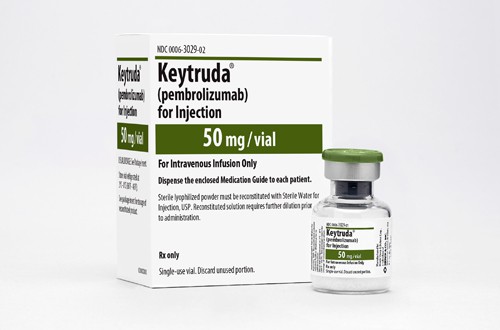
Merck & Co is closing on a new indication for its checkpoint inhibitor Keytruda in early bladder cancer in the US, following a positive vote by an FDA expert panel.
The Oncologic Drugs Advisory Committee (ODAC) voted nine to four that Keytruda (pembrolizumab) should be approved for the treatment of certain patients with high-risk, non-muscle-invasive bladder cancer (NMIBC), setting up a possible green light by the FDA next month.
NMIBC is a low-grade tumour found in the tissue lining the bladder, and is currently usually treated with Merck’s TICE Bacille Calmette-Guérin (BCG) vaccine, intended to boost the immune system’s response to the cancer.
Keytruda is being targeted at a group of NMIBC patients who are unresponsive to BCG and are either unwilling or unable to have radical surgery to remove the bladder – typically a treatment of last resort for this type of bladder cancer.
Around 30% to 40% of NMIBC patients don’t respond to BCG, and Keytruda would be an option for those who can’t go down the surgical route and currently have “limited treatment options”, according to Merck’s chief medical officer Dr Roy Baynes.
At the moment the only other option for high-risk NMIBC patients in this setting is chemotherapy delivered directly into the bladder.
Keytruda was filed for approval on the strength of the single-arm, phase 2 KEYNOTE-057 trial of the PD-1 inhibitor in 102 high-risk NMIBC patients, who had carcinoma in situ (CIS) – very early, high grade cancer cells – with or without papillary tumours.
The patients had been treated a median of 12 times with BCG but were still seeing disease progression. Keytruda given every three weeks resulted in a complete response in 40% of patients at 12 weeks – the primary endpoint of the trial – which is at least twice the rate expected with chemo drugs.
Keytruda has already been approved for first- and second-line treatment of urothelial carcinoma – another form of bladder cancer – along with most of the other approved checkpoint inhibitors including Roche’s Tecentriq (atezolizumab) and Bristol-Myers Squibb’s Opdivo (nivolumab)
With the positive vote Keytruda looks set to be the first in the class to claim approval in NMIBC, although Tecentriq and AstraZeneca’s Imfinzi (durvalumab) are also in late-stage testing for this indication.
Other treatment approaches are also coming through development. Earlier this month, Ferring Pharma and private equity firm Blackstone set up a gene therapy joint venture called FerGene to take forward a gene therapy for NMIBC that could be filed for approval next year.
Merck estimates more than 80,000 new cases of bladder cancer will be diagnosed in 2019 in the US alone, and 75% of those will be NMIBC.




